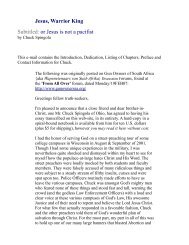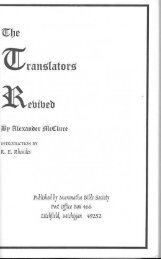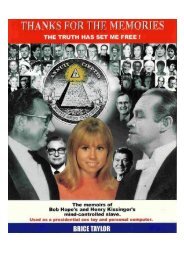THE PINK SWASTIKA - Shattering Denial
THE PINK SWASTIKA - Shattering Denial
THE PINK SWASTIKA - Shattering Denial
Create successful ePaper yourself
Turn your PDF publications into a flip-book with our unique Google optimized e-Paper software.
Wylie, a young official in the War Office. Ostensibly they were escorting a group of pro-fascist<br />
schoolboys to a Hitler Youth camp. But from Burgess’ uproariously bawdy account of how his<br />
companions discovered that the Hitler Jugend satisfied their sexual and political passions, the trip<br />
would have shocked their sponsors -- the Foreign Relations Council of the Church of England<br />
(Costello: 300).<br />
In pre-World War II France, the pro-Nazi faction was represented by the Radical-Socialist Party<br />
(RSP) and the Popular Party (PP). The Secretary-General of the RSP was Edouard Pfeiffer. Costello<br />
writes of Guy Burgess' visit to Pfeiffer in Paris shortly before the war:<br />
As a connoisseur of homosexual decadence, Pfeiffer had few equals, even in Paris. As an officer of the<br />
French Boy-Scout movement, his private life was devoted to the seduction of youth. Burgess<br />
discovered all this when he visited Pfeiffer's apartment in Paris and found...[him] with a naked young<br />
man...he explained to Burgess that the young man was a professional cyclist, who just happened to be a<br />
member of Jacques Doriot’s Popular Party (ibid.:315).<br />
Once again we see flagrant sexual perversion in the heart of the Nazi movement -- long after the<br />
Roehm Purge. It appears also that the correlation between Nazism and homosexuality disregarded<br />
national boundaries. As we have seen, both Hans Blueher and Benedict Friedlander observed that youth<br />
organizations are often (in their view, appropriately) led by pederasts. Events in Europe during the first<br />
part of the twentieth century, particularly those involving the National Socialists, strongly support this<br />
theory.<br />
The revival of Hellenic culture in the German homosexual movement, then, was an integral factor in<br />
the rise of Nazism. Right under the nose of traditional German society, the pederasts laid the<br />
groundwork for the ultramasculine military society of the Third Reich. The Wandervoegel was certainly<br />
not a “homosexual organization” per se, but its homosexual leaders molded the youth movement into<br />
an expression of their own Hellenic ideology and, in the process, recruited countless young men into<br />
the homosexual lifestyle. The first members of the Wandervoegel grew to manhood just in time to<br />
provide the Nazi movement with its support base in the German culture. As Steakley put it, “[the] Free<br />
German Youth jubilantly marched off to war, singing the old Wandervoegel songs to which new,<br />
chauvinistic verses were added” (Steakley:58).<br />
Gerhard Rossbach and the Freikorps Movement<br />
The Freikorps movement began during the years immediately following the close of World War I.<br />
After the war and the subsequent socialist revolution in Germany in 1918, tens of thousands of former<br />
soldiers of the German army volunteered for quasi-military service in a number of independent reserve<br />
units called Freikorps (Free Corps), under the command of former junior officers of the German army.<br />
These units were highly nationalistic and became increasingly violent as the social chaos of the Weimar<br />
Republic worsened. Rossbach’s organization, originally called the Rossbachbund (“Rossbach<br />
Brotherhood”) exemplified the German Freikorps. As Waite records in Vanguard of Nazism, “the<br />
lieutenants and the captains — Roehm...Ehrhardt, Rossbach, Schultz and the rest — formed the<br />
backbone of the Free Corps movement. And...it was they who were the link between the Volunteers<br />
[anti-communists] and National Socialism” (Waite, 1969:45). Once again we see the essential<br />
relationship between homosexuality and Nazism, since many of these “lieutenants and captains” were<br />
known or probable homosexuals, some of whom eventually served in the SA. German historian and









